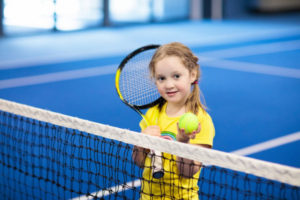

Benefits of Sports for Kids
Sports have undeniable advantages in a child’s life. Physical and mental growth give children an advantage in life that goes beyond academic achievement. As a result, the child can maintain his or her health while also discovering a new passion or interest.
Some of the main benefits of sports for kids are:
Physical development
- With an increased level of cardiovascular activity, sports help maintain lung and liver health and helps avoid serious health problems.
- Children can fight off obesity easily and ensure that their overall health stays in check.
- The child experiences increased levels of energy throughout the day.
- Sports help the child break free from the monotony of a sedentary lifestyle.
- Physical activity helps release serotonin, a chemical responsible for regulating mood, hunger, and even sleep.
Improved posture
- Sports promote a healthy overall posture, and it also helps improve coordination and balance.
- Improved coordination means that the child will have better hand-eye coordination and will be able to perform better in tasks that require multitasking.
- A better posture supports healthy bone development, and the child is less likely to contract a bone-related issue or have back problems later in life.
Sports foster better social skills
- Kids learn to be a part of the team and learn proper social etiquette.
- Children form life-long friendships and relationships that benefit them even in their old age.
- Children form connections with people of all ages, and they also learn values and skills that can help them develop a mature attitude towards life.
- These social interactions also help to shape future careers and workplace abilities. The child communicates with a variety of people, their communication skills improve, and their confidence grows.


A healthy attitude towards competition
- “Sometimes we win, sometimes we learn.” This phrase perfectly sums up the attitude a child can form by regularly engaging in sports.
- The child develops a new and healthy outlook on the ideas of success and failure.
- Sportspersons go through ups and downs in life constantly. And each match or play for them is a learning opportunity, and therefore, sports can teach the child how to cope with situations that don’t go the way they expected.
Kids learn to respect authority
- Every sport has tasks and responsibilities assigned to different members of the team. Sports teach children how to work as part of a team and how to respect one another.
- The coaches help the team form strategies for a game. Coaches also instruct and educate team members on how to play a specific sport. The children learn how to obey rules and understand that each rule is in place to help them perform better when in practice.
Improved self-esteem
- Positive reinforcement works like magic for children.
- In sports, the child receives constant reassurance and support, which improves their emotional health and makes them feel better about themselves in general.
Role of Parents in Sports for Students
Parents play a crucial role in their children’s habit formation, which includes an interest in sports.
Lead by example
Children learn from their environment, and watching their parents be active helps them develop an interest in being active themselves. Being active throughout the day will also support the parent’s well-being, and when both the parent and child are healthy, they can participate in sports together and spend more time with each other.


Monitor the child’s sports activity and interests
To ensure that their child gets enough physical activity during the day, parents must keep track of their child’s sedentary behaviours or screen time.
Train them and seek proper assistance
Work with your child. Go out for walks, take them out for cycling and skating practices and give them a chance to practice with you so you can analyze their potential and interests.
Avoid pushing the child and allow them to recover from sessions
Even if a child participates in a sport or other physical activity, it is best to allow them enough recovery time. Strenuous workouts can trigger physical stress, and adequate recovery time is essential for the child’s overall health.
Include sports in your family outings
Family outings can serve as an opportunity to include sports and engage with the child as well. During picnics, parents can organize fun team activities that would require everyone to participate. This activity promotes bonding and generates interest in the sport.
Support your child’s efforts in sports activities
Every child has their skillset, and it is necessary that every effort is appreciated and the child is motivated without drawing attention to the drawbacks. Some children might be athletic, while others might make an effort but require more practice. Every child seeks appreciation to stay motivated, and therefore, parents and coaches should avoid comparing children unnecessarily.
Sports Activities & Games for Kids
Bicycling
One of the first physical activities that a child is fascinated by is cycling. Riding on a bike gives the child a sense of freedom and makes them feel independent and confident about their abilities.
- Cycling can improve coordination and reflexes in a child.
- It also promotes social awareness as the child learns about patience and road safety.
- The child also develops discipline and consciousness of their surrounding while being in nature.


Football
Football is one of the most loves sports around the world. Children enjoy juggling balls, and they work in teams and get an adrenaline rush upon scoring goals.
- Football improves leg-eye coordination.
- The constant running and juggling of the ball improves stamina and helps control weight.
- It also improves flexibility and overall balance.
Swimming
Children love splashing around in the water, and children fascinated by mermaids and fishes enjoy it even more. Swimming is a great way to have fun and build stamina at the same time.
- Swimming also improves lung health, as it requires a lot of underwater breathing techniques, and the participant must hold their breath for some time.
- It also supports muscle health and helps build stronger muscles.
Tennis
Tennis is known for its competitive spirit, and children tend to enjoy sports that involve fast movement and quick thinking.
- It improves the thinking abilities of the child.
- It requires quick movement, which develops the child’s reflexes.


Track
Children also developed an interest in running because of marathons and cartoons encouraging track and field sports. It enhances the child’s attention, concentration, and endurance.
- Children learn how to work with each other.
- It teaches them time management skills.
- Track runners tend to have better hand-eye coordination as well.


Karate
Karate and martial arts have gained popularity due to anime and martial art movies. Children try to fight each other like their favourite characters and even practice hand gestures that replicate their beloved anime characters.
- Karate promotes discipline and self-control.
- It builds flexible muscles and improves balance.
- Karate helps children develop a schedule by requiring them to attend early morning practice sessions and to dress appropriately for the occasion.


Sports have many advantages that aren’t limited to children’s physical well-being. As a result, parents and children must collaborate to participate in daily movement, even if it is as easy as going for a stroll. After all, a healthy body helps a healthy mind.
References
Developing life skills through sports
Image source: Pexels
Written by Stuti
Related Blogs
FREE Sports class Demo at your preschool
Please fill the form to get more information and set up a FREE Go Alpha Demo at your preschool.




